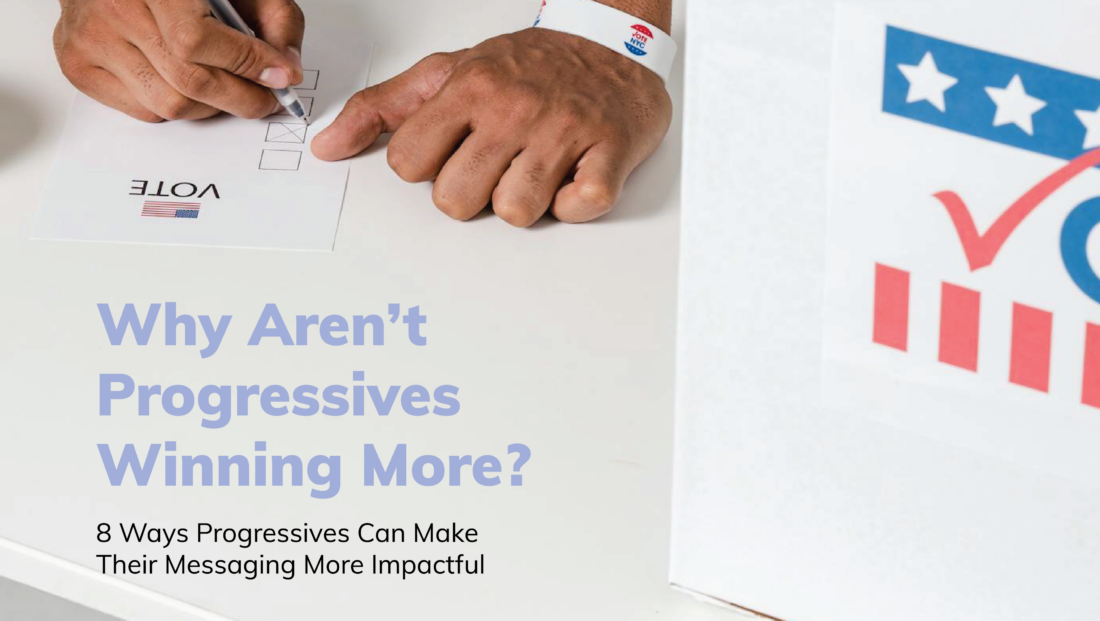
8 Ways Progressives Can Make Their Messaging Strategy More Impactful
Progressives are facing numerous recent setbacks – key race losses, policy disappointments, and a decline in engagement from a once-committed base – that will have implications in the upcoming presidential election and beyond.
What impact do the marketing and communications aspects of progressives’ ideology and campaigns have on this recent shift? How can messaging affect key races and help maintain historically progressive seats?
Our advocacy team has been curious about the answers to these questions, so we researched the topic and hosted a recent internal Media Cause meeting to dive into the data and discuss these questions from a marketing and communications POV. Here are some takeaways from our conversation.

What We Found: Setting the Scene
Today, Americans are sharply divided in their worldviews but still share core priorities. Sixty-six percent of Democrats think that the world is full of good people and we should not allow ourselves to become isolated. In comparison, only 27 percent of Republicans share that sentiment. Instead, 64 percent of Republicans think that our lives are threatened and our priority should be protecting ourselves.
The shocker? Regardless of party affiliations, 90 percent or more of U.S. adults think the following are extremely or very important to the U.S.’s identity: the right of everyone to equal protection under the law, the right to vote, and freedom of speech.
Conservatives are capitalizing on the unease within their party and using them to their advantage. Through methods like emotional appeals and simple repetition, their messaging is resonating and moving the needle. If progressives want to counter that momentum they’ll need to overcome their often complex and fragmented messaging and take some cues from conservatives’ strategy.
These stark differences (but similar identity markers) create a springboard for more radical messaging to take hold and lead to the prediction that Republicans will win across the board with more certainty and will need relatively less convincing to do so.
The Challenges Progressives Face
- Complex Messaging: Progressive policies often address systemic and multifaceted issues, which can be difficult to condense into simple, clear messages. This complexity can make it harder for the message to resonate with a broad audience.
- Fragmentation: The progressive movement addresses a wide range of issues and represents many groups, leading to fragmented messaging. While inclusion is important, it can result in a less cohesive, unified message.
- Use of Facts and Data: Progressive messages often include statistics, research findings, and detailed policy proposals. However, this tactic may not be as compelling or memorable as emotional appeals.
Versus: What Conservatives Do Well
- Emotional Appeal: Conservative messaging often taps into fear, national identity, and nostalgia for traditional values, which can evoke a direct response. Progressive messages, which may focus on long-term benefits and systemic changes, can sometimes lack the same emotional immediacy.
- Narrative Control: Conservatives often excel at controlling the narrative by framing issues in alignment with their values and beliefs. Progressives sometimes struggle to frame their core issues in a similarly compelling manner that also resonates with a wide audience.
- Simplification and Repetition: Conservatives often use simple, repetitive slogans that are easy to remember and share (e.g. “Make America Great Again”). Progressive messaging is often more nuanced and complex, making it harder for their messages to stick in the public consciousness.

8 Ways Progressives Can Change Their Messaging
- Stop leading with the problem. We’ve sounded the alarm enough. It doesn’t work because it overwhelms people.
- Lead with shared values instead. The progressive agenda also includes the shared values of family and freedom. Conservatives do NOT own those terms.
- Identify the villains. Systemic inequalities don’t just exist. The wage gap didn’t widen on its own. Politicians and corporate leaders created systemic inequalities and widened the wage gap to enrich themselves. Get specific on who the villains are and identify their actions as intentional.
- Spotlight the solution. Leave people saying “Yes” rather than “No” – i.e. advocate for a solution rather than just pointing out the problem. Also, refrain from using terms like “reform” or “mitigate” when describing the solution. It may be accurate to use those terms, but they do not inspire people.
- Advocate for the outcomes. Minimum wage increases allow people to afford housing. Paid family leave lets parents spend time with a new baby. Focus on the real-life outcomes for everyday people rather than the policy or process.
- Don’t focus on refuting the opposition. Research shows that rebutting the opposition makes their claims more memorable because it gives the issue more airtime.
- Craft messaging that truly ignites your base. Don’t test for messaging that appeals to everyone. Focus on firing up your base and find words people connect with and feel inspired to repeat. Your base will become empowered to persuade the middle.
- Simplify. Focus on clear, concise, and easily understandable messages. Use memorable slogans that encapsulate key points and can be easily repeated and shared.
Winning Words: A Study
Many current issues are complex and multi-faceted, and progressives have long been devoted to telling the whole story. This is something to celebrate, but to help voters understand them, we need to do some honing in and boiling down. There’s room, time, and space for the complexity, the nuances, and the diversity of thought within the movement – but we need to be disciplined in how and when we deliver our messages.
It is easier to win with simple, values-driven, easy-to-understand messaging. Therein lies the push and pull of communicating thoroughly and unraveling complex ideas vs. creating digestible talking points the public can understand. Finding a way to do both can be challenging.
An In-Action Example: The Pro “Life” Movement
In June 2022, in a devastating decision that will reverberate for generations, the U.S. Supreme Court abandoned its duty to protect fundamental rights and overturned Roe v. Wade, ruling there is no federal constitutional right to abortion. The ruling in Dobbs v. Jackson Women’s Health Organization abandoned nearly 50 years of precedent and marked the first time in history that the Supreme Court has taken away a fundamental right.
Applying Our Learnings
- The emotional appeal of the pro-choice movement is fragmented: the impact of losing abortion rights is both immediate and long-term and long-term messaging lacks the same emotional immediacy as “people are murdering babies right now and we need to save them”.
- The messaging is overcomplicated. There are many cases to highlight the need for abortion rights from high-risk pregnancies to victims of sexual abuse. And you would think that the more case-in-points you have on an issue, the more influential it will be. But this is unfortunately not the case. Our creative challenge is to communicate powerfully and simply, without being simplistic. “Abortion is murder” is clearly compelling and easy to grasp; how might we distill a similarly potent concept?
What Could Be Done Differently?
- Reclaim and reframe the term “life” from conservatives, demonstrating how pro-life is allowing women to live full lives by having control over their bodies.
- Simplify the messaging to better engage the general public. Focus on women’s lives and rights and put less of an emphasis on the individual circumstances that women cite.
Hitting the right messaging mark with constituents is complex and ever-changing; campaigns have entire departments dedicated to it, down to the decision to use one word versus another. This work is a matter of words, and words matter.
To learn more about crafting a compelling advocacy messaging strategy, make sure you’re signed up for our monthly newsletter. If you want more hands-on help with strategy, marketing, and messaging, check out our marketing services!